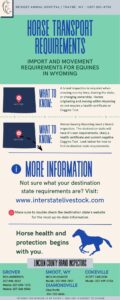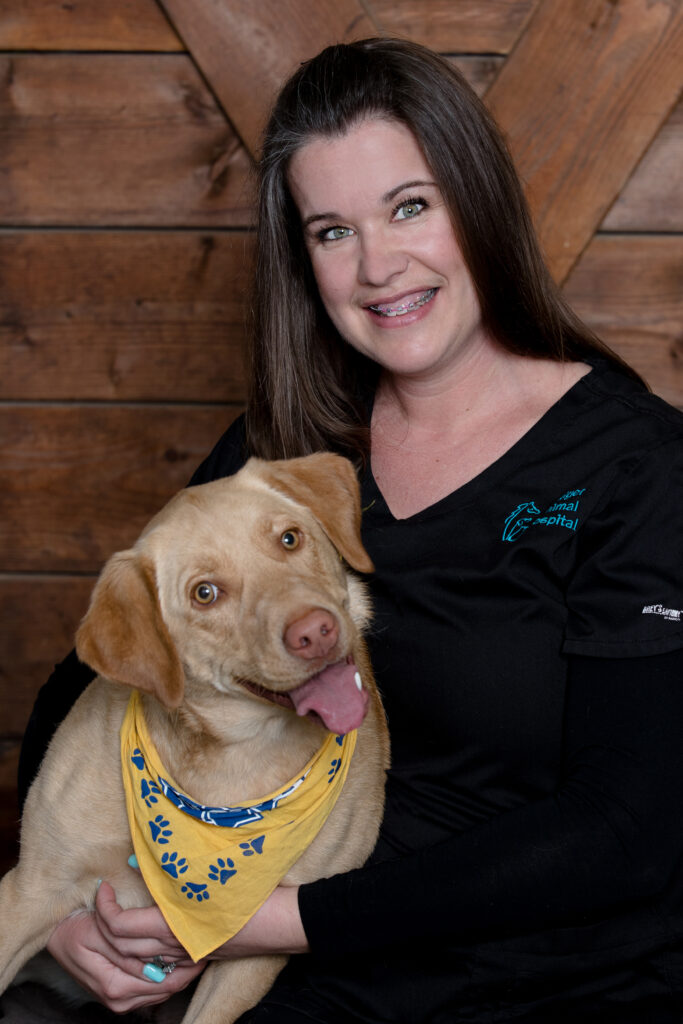Horse Transportation

Author: Maggie McCaslin, CVBL, Practice Manager
We live in a really great part of the country where the trails are endless, and the potential for participating in equine sports is large! Whether it’s travelling to high school rodeos, pony club rallies, or finding that next big trail adventure, you will be faced with travel requirements for your equine friends. In this article, we aim to give you some helpful information that will hopefully take some of the guesswork out of getting you and your horses to your desired destination.
Coggins Test
One of the first things you will need to have when you travel is a Coggins test. A Coggins is a blood test that tests your horse for a virus called Equine Infectious Anemia (EIA). This virus causes fever, weight loss, anemia, swelling in the limbs, icterus (yellowing of body tissues), and weakness. There is no treatment and no vaccine. Horses are exposed to this virus by large biting flies, or by needles and/or equipment contaminated by an infected horse. It is incredibly important that horses that are positive for EIA don’t travel.
Each state has specific requirements regarding the length of time required between Coggins tests. Most states require a test every twelve months, however some states require them every six months. We can help you determine the requirements based on your destination state. You can also find helpful links at the bottom of this article, or click here.
Health Certificate (CVI)
Next, you will need a health certificate. A health certificate, or a Certificate of Veterinary Inspection (CVI), is a document that your veterinarian will provide after a physical exam is completed. The health certificate will list:
- The owner’s information
- The consignor’s name, if the horse is being sold/boarded somewhere else
- The origination location
- The destination location
- The method of transport
- The reason for transport
- The horse’s name, age, breed, sex
- The horse’s EIA results
It’s important to note that there are usually guidelines on when the examination needs to take place in relation to the date of departure. There are also restrictions on how long these health certificates are valid. Some states also require permits for entry, requiring extra time and effort from your veterinary staff. These are all reasons to make sure you give your self plenty of time prior to your date of departure to get all of your paperwork lined up. For more information regarding guidelines on examination timelines, or the length of validity, please reach out to us, check out the handy links at the end of this article, or click here.
GlobalVetLink

Bridger Animal Hospital utilizes a service called GlobalVetLink, which offers digital downloads of your Coggins Test Results and your CVI. This is really helpful as you can access your documentation anytime, anywhere. Gone are the days of waiting for paper snail mail. You will be given information during your veterinary appointment regarding how to access these digital files while creating your own user account. It’s pretty awesome! If you’d like to take a look at the client side of GlobalVetLink, check them out here.
Brand Inspection
Another document you will need when you travel with your horse(s) is a brand inspection. A brand inspection is a document that proves ownership of the horse. This needs to be provided by a Brand Inspector. They will examine the horse and proof of ownership materials and determine whether or not the horse in question belongs to you. If it does, he will give you a document that lists your information, your horse’s information, and the date of purchase or acquisition. It’s really important that this document travel with the horse, especially when crossing state lines. You can find a list of Wyoming brand inspectors by clicking here.
Helpful Links
To determine what the requirements are for your destination state, please visit:
- https://www.interstatelivestock.com/
- This site allows you to enter your origin, your destination, and the species you plan to travel with. Make sure to select Equine as your species.
To learn more about Equine Infectious Anemia, please visit:
For a list of Wyoming Brand Inspectors, please visit:

We hope you found this information helpful. If you have any questions regarding anything you read in this article, please reach out to us! We’d love to hear from you!
Until next time, keep smiling and taking care of those awesome horses!
This blog is presented to you by Maggie McCaslin, certified veterinary business leader and practice manager at Bridger Animal Hospital. If you have any questions regarding anything in this article, please reach out to us.

